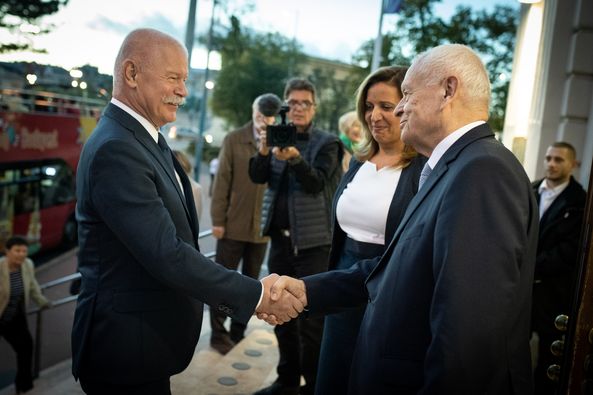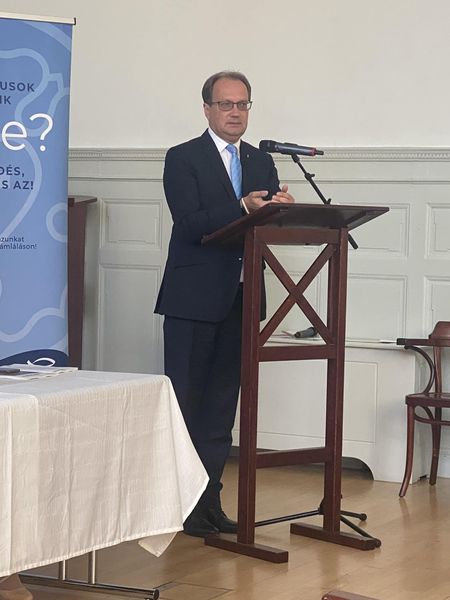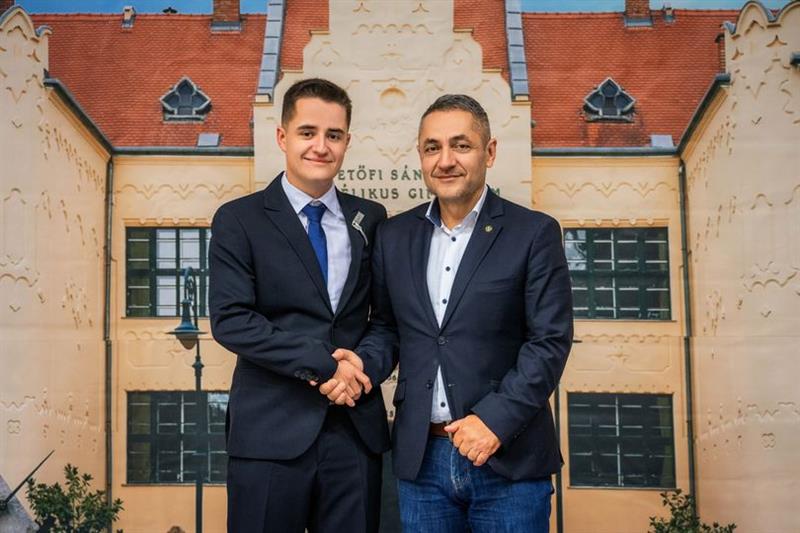 Új technikát alkalmaztam az ATV-ben: az ellenzéki vitapartnerem mindig tesz egy erős állítást, majd visszakérdezek. Ezután a legtöbbször kiderül, hogy mégsem az a helyzet pontosan, mint amit korábban…
Új technikát alkalmaztam az ATV-ben: az ellenzéki vitapartnerem mindig tesz egy erős állítást, majd visszakérdezek. Ezután a legtöbbször kiderül, hogy mégsem az a helyzet pontosan, mint amit korábban…
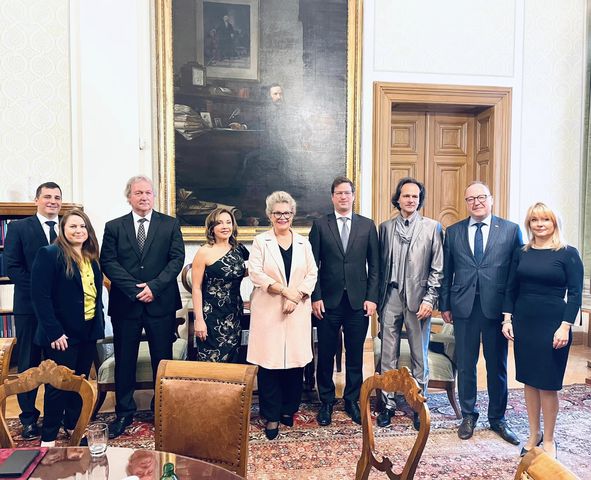
“Give peace a chance! Adj esélyt a békének!”
The UN World Order on the Brink of Falling Apart
Russia’s war against Ukraine has thrust the United Nations into crisis. Speech by the Chairman of the Foreign Affairs Committee of the Hungarian National Assembly at the 75th anniversary of the UN Association of Hungary, 24 October 2022.
Being a moaner, a prophet of doom, at a festive moment may not be a rewarding task. However, to foster or even allow illusions at critical moments is irresponsible. That is why it is worthwhile, even obligatory, to face up to the real situation of the UN on this celebratory occasion and to raise awareness that this is one of the most difficult situations since it was established.
For no other reason than the Russian aggression against Ukraine. A permanent member of the UN Security Council—that, we all know, has veto power, and is therefore a pillar of our current world order (we might as well call it the ‘UN world order’)—has attacked his sovereign neighbour in contravention to the fundamental principles and values of the UN.
The values of the UN are not fiction; they are clearly formulated in writing, enshrined in the UN Charter, indeed, an international agreement. Respect for sovereign equality and the obligation to resolve conflicts peacefully apply equally to all UN Member States. Like it or not, the simple fact is that Russia has violated them in the most flagrant manner possible.
To top this especially grave act, soldiers of the Russian Armed Forces have also committed—and presumably continue to commit—very serious humanitarian violations in the territory of the attacked state. The perpetrators have not been held accountable. Moreover, there are no plans to prosecute them. Some of them are even decorated from time to time!
So, while it may be debatable how wise it is for tactical reasons to call Russian leaders war criminals, there is no doubt that Slobodan Milošević and Ratko Mladić were taken to The Hague for very similar acts. The only difference is that Yugoslavia was not a permanent member of the Security Council. Therefore, crimes in Yugoslavia were more easily penalized by the international community than the current ones.
That is why the situation at the UN is extremely serious! Basically, two scenarios can be envisioned— the third one, where Russia ‘repents’: withdraws, apologises, pays reparations, and prosecutes the perpetrators by itself, is, to say the least, unlikely.
What remains, therefore, is either that, as Moscow expects, the UN, as an organisation and as a community, sooner or later comes to terms with what happened, or that Russia will be somehow excluded from the pillars of world order, its membership suspended.
Neither solution bodes well for the future of the UN! If the UN went along with what is happening now, it would lose credibility in the same way the League of Nations had when it let Hitler run riot. In this case, the UN may well survive as an organisation—there will be buildings and officials and debates and documents—but no one will ever again believe that it is capable of taking its own values (its Charter) seriously, that is to say, of maintaining and promoting peace. If, on the other hand, they try to exclude Russia from the pillars of world order, it will be very difficult to do so within the UN framework because of Russia’s veto. According to some clever people, the easiest way to achieve this scenario is to create a new organisation, now without Russia, while the UN either disappears completely or ceases to be the central organisation of the world order.
This would be very bad for Hungary, because, along with the UN, the UN Charter—that is, the entire UN value system—would pass into oblivion. So would concepts such as the sovereign equality of nations, which protects nations of our size; or the basic value of peace and security, which protects countries with limited military power like ours, or, to say no more, the UN Declaration on the Rights of Minorities.
Let us be under no illusion: there are many opponents of these value-bearing concepts, because they protect nations, protect identity and sovereignty, in other words, they are an obstacle to globalism and internationalism, which seek to abolish nation states. If the UN were to be replaced by a new institution—or nothing at all—as the organisation of world order, there would certainly be heavyweights among the architects of the new system who would seek to abolish or water down these concepts that protect national sovereignty. And they will most certainly achieve something—it is difficult to estimate how much.
So, a world order without the UN would almost certainly be worse for us than a UN world order with all its weaknesses.
Our task is thus to solve an equation with several unknowns: how to maintain a UN upholding UN values?
The fact that the UN General Assembly has a Hungarian president for a year gives us some occasion to foster Hungarian interests in this area. However, few people in the world are in a more difficult position than Csaba Kőrösi and the other UN leaders. They have to save the UN values without letting it fall apart and sweep its values away.
Zsolt Nemeth
 /posztok.hu
/posztok.hu

 ️
️ Ursula von der Leyen nagyobb összegekről sms-ezett a Pfizer-vezérrel, mint amennyi pénz Magyarországnak jár a kohéziós alapból hét év alatt!
Ursula von der Leyen nagyobb összegekről sms-ezett a Pfizer-vezérrel, mint amennyi pénz Magyarországnak jár a kohéziós alapból hét év alatt!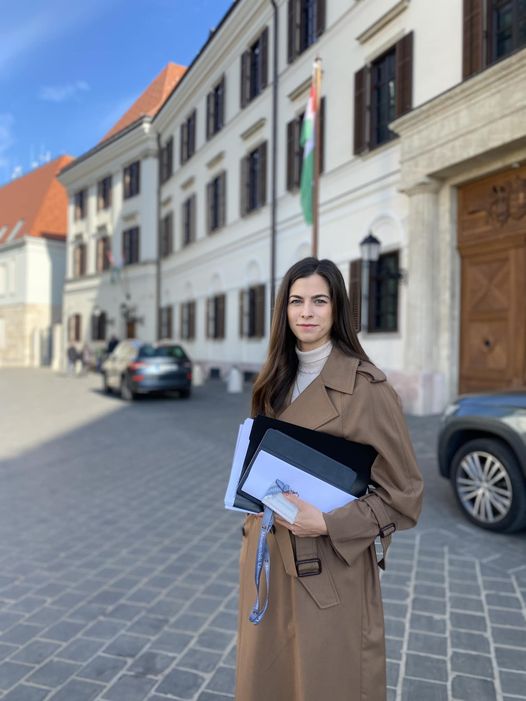
 Hogyan lehet javítani a talajok vízháztartását
Hogyan lehet javítani a talajok vízháztartását
